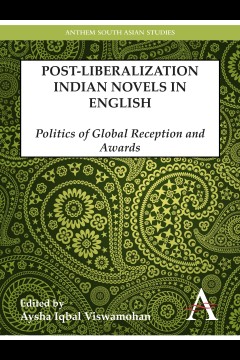Postliberalization Indian Novels in English
Politics of Global Reception and Awards
Edited by Aysha Iqbal Viswamohan
- About This Book
- Reviews
- Author Information
- Series
- Table of Contents
- Links
- Podcasts
About This Book
Indian novels in English have generated a considerable amount of interest both in India and in English-speaking countries, particularly during India’s postliberalization period since 1991. For India, this period has seen unparalleled consumption of global goods and exposure to international media, and has resulted in Indian writers writing in English (including writers of Indian origin) catching the attention of the Western world like never before.
“Postliberalization Indian Novels in English: Politics of Global Reception and Awards” focuses on Indian writers writing in the English language, whose concerns are related to India in her immediacy, and who have come into literary prominence in the postliberalization period. Such writers have broached issues including nationalism, diaspora, identity, communalism, subaltern representation, modernism and the impact of globalization. Although the idea of this study is not to undermine the value of their novels, its aim is to consider the correlation of their novels’ themes with the workings of the organized, global market processes now present in postliberalized India.
As such, some large questions arise: What are the cultural and critical frameworks that define literary reception? Has there been a marked shift in the reception of Indian novelists writing in English postliberalization? To what extent are the works of these writers driven by the dictates of the market, and does a commercially/economically driven media influence critical/commercial perceptions? And are there certain thematic concerns and representations which are deemed “prize and attention worthy,” and do these factors influence the critical/commercial reception of the novels?
In investigating these questions, this critical handbook reveals the forces shaping the modern Indian novel in the postliberalization period, and provides a systematic approach to the study of Indian novelists in terms of their global reception.
Reviews
‘The idea for this book is a good one: what happens to the publishing industry and readership and creative writing once a national economy is opened up to the global free market and there is an upsurge of English-speaking middle-class young adults with the capacity for international travel? […] [This book is] a productive contribution to Indian English fiction studies.’ —Paul Sharrad, ‘Journal of Postcolonial Writing’
‘This is a stimulating and scholarly study of several postliberalization Indian English novels in their multiple thematic and technical aspects. The essays lay bare the inherent authorial anxiety to harmonize the creative with the commercial for a rewarding reception in the global market. A rare critique to relish and recommend.’ —Sukhbir Singh, Professor of English, Osmania University, Hyderabad
‘Very convincingly, the volume charts out the socioeconomic and cultural terrain of the subcontinent’s literary production in English and daringly addresses some of the most contentious debates that surround the literary body that has come to be called Indian English literature. The wide range of articles included in the volume gel uncannily well with each other in situating the contribution of contemporary icons such as Adiga, Kiran Desai, Jeet Thayil, Swaroop among other notable writers.’ —H. S. Komalesha, Associate Professor of English, Indian Institute of Technology Kharagpur
‘“Postliberalization Indian Novels in English” is a welcome addition to an emerging body of criticism that highlights the paradoxes and possibilities of Indian English writing in the era of ‘the New India’. This collection of essays engages with and stages debates about key theoretical and critical concepts in postcolonial and cultural studies, including cosmopolitanism and transnationalism, national and diasporic identity, the politics of representation, elite versus popular audiences, and the complexities of using English as a vehicle for representing India.’ —Pranav Jani, author of ‘Decentering Rushdie: Cosmopolitanism and the Indian Novel in English’, and Associate Professor of English and Postcolonial Studies, Ohio State University
Author Information
Aysha Iqbal Viswamohan teaches and writes on film studies, popular culture, drama and contemporary South Asian fiction. She is an associate professor in the Department of Humanities and Social Sciences at the Indian Institute of Technology, Madras, India.
Series
Anthem South Asian Studies
Table of Contents
Acknowledgements; Preface – Tabish Khair; Introduction; 1. A Maverick-Scholar: The Writings of Pankaj Mishra – A. N. Dwivedi; 2. Commodification of Post-Rushdie Indian Novels in English: Kunal Basu and the Politics of Decanonization – Angshuman Kar; 3. Marketing Lad Lit, Creating Bestsellers: The Importance of Being Chetan Bhagat – Aysha Viswamohan; 4. Vikas Swarup: Writing India in Global Time – Chinmoy Banerjee; 5. “The God of Small Things”: Arundhati Roy’s “Made in India” Bookerboiler – Chinna Devi Sangadi; 6. Aravind Adiga: The White Elephant? Postliberalization, the Politics of Reception and the Globalization of Literary Prizes – John Masterson; 7. The Multinational’s Song: The Global Reception of M. G. Vassanji – Laura Moss; 8. Shreds of Indianness: Identity and Representation in Manju Kapur’s The Immigrant – Letizia Alterno; 9. Inside “The Temple of Modern Desire”: Re-Collecting and Re-Locating Bombay – Maria Ridda; 10. Tabish Khair: Marketing Compulsions and Artistic Integrity – Om Prakash Dwivedi; 11. Rohinton Mistry and the Can-Lit Imperative – Patricia Gruben; 12. Amitav Ghosh: The Indian Architect of a Postnational Utopia – Sajalkumar Bhattacharya; 13. Here, There and Everywhere: A Review of Vikram Seth’s Multiple Literary Constituencies – Mala Pandurang; 14. Whatever Happened to Kaavya Viswanathan? – Shaleena Koruth; 15. Of Win and Loss: Kiran Desai’s Global Storytelling – Sara Duana Meyer; 16. Immigrant Desires: Narratives of the Indian Diaspora by Chitra Banerjee Divakaruni – Tutun Mukherjee; Glossary; List of Contributors; Bibliography; Index
Links
Stay Updated
Information
Latest Tweets



